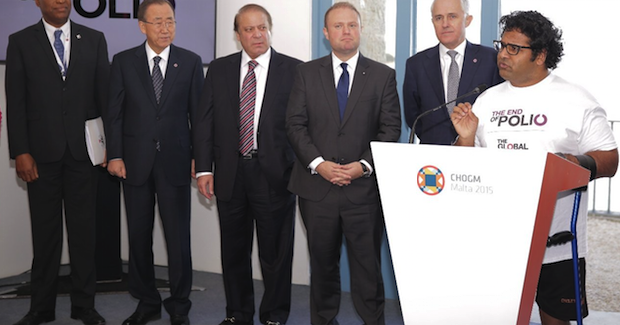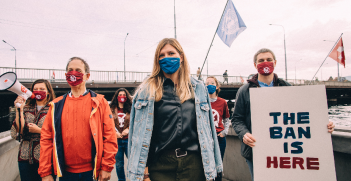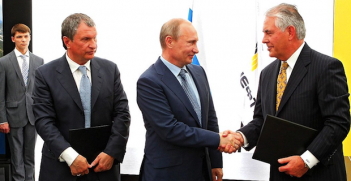Australia Can Help End Polio

The eradication of polio is absolutely achievable. The disease remains present in just a few countries and the vaccine required to immunise children against polio costs only 13 cents per dose. On World Polio Day on 24 October, Australia should know that the disease can be eliminated by coordinated global action and that Australia can play a significant role.
I have been an advocate to end polio ever since I met polio survivors in India crawling on the dirty streets because they didn’t have access to vaccines, corrective surgeries and rehabilitative supports like braces and crutches. Seeing their utter lack of mobility made me profoundly aware of the undignified life I could have lived.
I was born in India and was diagnosed with polio when I was six months old. This should have sealed my fate. Instead, I was adopted by a family in Canada, a country where I was able to receive the critical medical attention that grants me the ability to walk today with the help of braces.
I will always be grateful for the opportunity I have been given. This is why I have partnered with Global Citizen, a campaigning and advocacy organisation with the mission to end extreme poverty by 2030. Together, we are campaigning key donor governments to fully fund the at least US$1.5 billion (A$1.9 billion) needed to once and for all eradicate polio by 2019.
Over the last few weeks, I have travelled to Canada, the US and Australia and met with prime ministers, members of parliament, celebrities and advocates. In Montreal, I stood on stage at a Global Citizen Concert to end AIDS, Tuberculosis and Malaria calling for the end of polio in front of 15,000 people. I made the case that the success of our polio eradication efforts serves as a blueprint for combating other terrible diseases. Moreover, the savings we will amass once polio is gone, US$50 billion in 20 years, can be used to strengthen healthcare systems and be redirected toward addressing other health emergencies.
After this event, I met with Bill Gates and he reaffirmed his support and commitment to end polio through the Gates Foundation. The overwhelming public support I received from global citizens and influencers from all around the world has convinced me that united we can achieve a polio-free world within our lifetimes.
In order to reach these goals and rebound from setbacks, such as the recent tragic outbreak in Nigeria after two years as polio-free, we must pressure our governments to recommit to polio eradication by fully funding the Global Polio Eradication Initiative.
Australia is a key player in this endeavour. Last year, at the Commonwealth Heads of Government Meeting in Malta, I was fortunate enough to meet Prime Minister Malcolm Turnbull who pledged Australian support for ending polio:
“We are very committed to this campaign and this issue. It is of vital importance to the people of every country. It’s a great tribute to the generosity, the philanthropy, in the truest sense of the word, of the Commonwealth, that polio eradication is deemed such a big priority in Malta.”
This is a commitment I applaud and I would like to praise Malcolm Turnbull for his government’s championing of this critical effort. I was further encouraged when early last week 20 members of parliament came together in a bipartisan display of support to launch the One Last Push campaign. These MPs have made a personal commitment to ensure Australian support right through to the last case.
Currently, Australia donates A$15 million per year towards polio eradication but next year this is scheduled to be reduced to A$3 million. However, Australia would do well not to pull back on its commitment to end polio.
By maintaining funding at the current level of at least $15 million per annum through to 2019, Australian aid could make a big difference. It could mean the difference between a child’s ability to live a dignified life as I am fortunate enough to have; or one where he is forced to drag his crippled legs through the streets as I saw too many times in India.
If Australia stops now on polio eradication, it is giving up on reaching one of the greatest public health achievements in history. An achievement that will ensure that all children, including future generations, will be able to live in a polio-free world.
By failing to eradicate polio from the last remaining strongholds, as many as 200,000 new cases per year could re-emerge, and within 10 years polio could spread across the globe. Furthermore, our success in eradicating polio by 2019 could serve as an early success and the litmus test for the ability of the international community to achieve the Sustainable Development Goals. At the moment, we have a narrow window of opportunity to build on the progress that has been made and stop polio once and for all. By bridging the funding gap, the Australian 45th Parliament could be the parliament to end polio, giving concrete evidence to the lifesaving power of Australian Aid.
Ramesh Ferris is a polio survivor and global advocate for the eradication of the disease.
This article is published under a Creative Commons Licence and may be republished with attribution.





